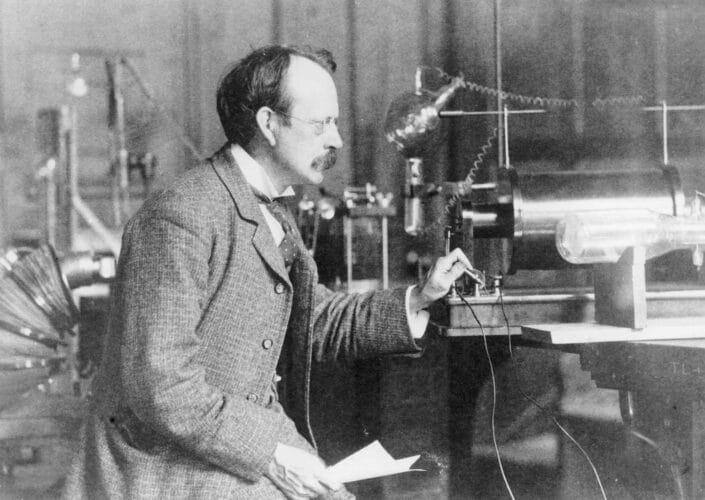Discovering the Electron: The Scientific Legacy of J. J. Thomson

J.J. Thomson (18 December 1856, – 30 August 1940) discovered the electron. In 1906 JJ. Thomson was awarded the Nobel Prize in Physics.
Life and Career
J.J. Thomson was born on 18 December 1856, in Cheetham Hill, Manchester, England. Thomson displayed exceptional academic prowess from a young age
He attended Owens College (now the University of Manchester), where he studied engineering. Later, he transferred to Trinity College, Cambridge, where he pursued mathematics and natural sciences. He graduated as a Wrangler (a term used for a high-achieving mathematics student) in 1880.
Thomson’s most famous achievement came in 1897 when he discovered the electron. He conducted experiments using cathode rays, which led him to propose that cathode rays were composed of negatively charged particles, which he named electrons. This discovery laid the foundation for our understanding of the atomic structure and opened the door to the field of particle physics.
Thomson made numerous contributions to the field of physics throughout his career, including work on the nature of conduction in gases, the discovery of isotopes, and his involvement in the development of mass spectroscopy. J.J Thomson passed away on 30 August 1940, in Cambridge United Kingdom.
Award and Legacy
J.J Thomson was honored with numerous awards and honors during his lifetime, including the Nobel Prize in Physics in 1906. He received the prize “in recognition of the great merits of his theoretical and experimental investigations on the conduction of electricity by gases.” Thomson’s discovery of the electron and his contributions to the understanding of atomic structure were fundamental to this recognition.
J. J. Thomson’s legacy is profound and far-reaching. His discovery of the electron revolutionized our understanding of the fundamental building blocks of matter and paved the way for the development of modern electronics and technology. His work laid the groundwork for subsequent advancements in particle physics and atomic theory, contributing significantly to the scientific and technological progress of the 20th century and beyond.
Observer Voice is the one stop site for National, International news, Sports, Editor’s Choice, Art/culture contents, Quotes and much more. We also cover historical contents. Historical contents includes World History, Indian History, and what happened today. The website also covers Entertainment across the India and World.

